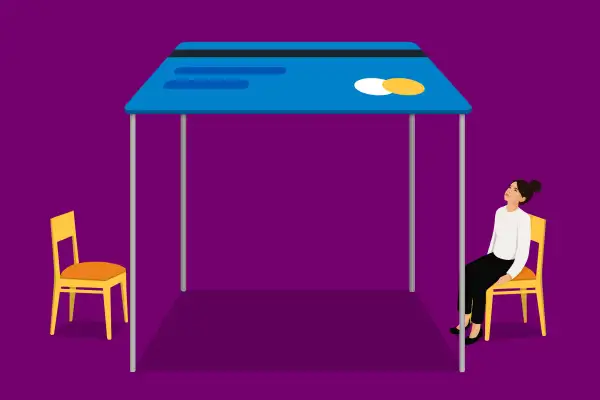Short-Term Interest Rates Are Close to Zero. Some Credit Cards Are Still Charging 30%

Short-term benchmark interest rates are close to zero. For mortgages, home buyers are paying less than ever. Credit-card borrowers have no such luck, with some retail store cards charging APRs of nearly 30%.
Last week the Federal Reserve found that the average APR for revolving credit products — that is, credit cards — jumped to 16.43% for August from an average of 15.78% in the second quarter. Among the most expensive cards out there: Retail store credit cards, which a 2018 report from the Consumer Financial Protection Bureau found charge nearly a third more, on average, than general-purpose cards.
Indeed, people who sign up for credit cards from brands including Appliances Connection, Big Lots and Petland will all be stuck with an APR of 29.99%. There are some retail sectors, primarily for big-ticket goods, where a 30% interest rate is more or less the standard. Jewelry retailers like Jared the Galleria of Jewelry, Zales, Pandora and Kay Jewelers all have APRs of 29.99%, and mattresses are another pricey category: Mattress Firm, 1800mattress and Ortho Mattress all charge 29.99%.
To put that in perspective, if you charged $1,000 and took three years to pay it off at that rate, you’d have to pay $460 in interest — nearly half the amount of your original purchase.
Inflated APRs Reflect Increased Risk
The easy approval process stores like to advertise for their cards is a big part of the problem. It’s “not as stringent sometimes as it is when you're applying for a bank-issued Visa or Mastercard,” says Bruce McClary, spokesman for the National Foundation for Credit Counseling.
The economic crisis brought on by Covid-19 is another culprit: Banks are bracing for a rise in defaults, particularly now that the expanded unemployment aid has expired and stimulus dollars have been spent. One key way issuers hedge against risk is by charging higher interest.
“There are millions still unemployed and millions more whose future employment is in question,” McClary says. “Uncertainty equals risk for lenders, and we’re in a very uncertain time right now.”
Consulting company Deloitte found that although consumer spending has risen from its trough in the spring, it’s still almost 5% below where it was before the pandemic swept the U.S. (even though we’re not shopping with cash nearly as much these days). In addition to worrying about our finances, which makes us reluctant to spend, Americans are also worried about their health and unwilling (or unable) to rack up bills by eating out at restaurants, going on cruises and attending ball games, concerts and other events.
The parent company of Comenity Bank, an issuer of many retail-branded credit cards, said in its last investor conference call that roughly 10% of its cardholders had asked for forbearance because the pandemic had left them unable to pay their bills — and revenue in its credit card division had fallen by 24%. Margaret Keane, CEO of Synchrony Financial, another big retail credit card issuer, said the pandemic led to a 7% drop in interest and fees and a 13% decrease in purchase volume in the second quarter.
Don’t Fall Into the ‘Free Money’ Trap
Credit card review sites that commission consumer surveys tend to find that a sizable minority — usually between one-third and one-half of respondents — say they have signed up for a store credit card around the holidays. Consistent across surveys, the most common reason people give for applying is the prospect of a discount. The holidays are a prime time for stores to add new credit card customers, which they often do by offering signup deals such as a discount off your first purchase or 0% interest for a number of months after you open the card.
But those deals come with some pretty significant caveats, such as sky-high APRs, that can easily cancel out any savings you get, McClary says. Many retailers that offer 0% interest structure their promotions so that that interest isn’t waived, just deferred — and if you fail to pay off the entire balance by the end of the promotional period, you could find yourself on the hook for substantial finance charges.
“That's what catches a lot of people. They don't sit down and do the math and make sure they can pay it off, and then they get stuck with the deferred interest. That happens all too often,” McClary says, adding that the minimum payment issuers set often won’t be high enough to pay off a purchase in time to avoid paying that deferred interest.
To make sure you don't get tripped up, divide the amount of your purchase by the number of months in the promotional period to figure out what your “real” minimum payment should be.
And if you already have high-APR store card debt that you’re paying down, McClary says there are a couple of things you can do. If you have good credit, it’s worth calling the issuer and asking if they’ll lower your APR. “It doesn't hurt to pick up the phone and try to negotiate your interest rate. It’s not a guarantee, but it’s worth trying,” he says.
Applying for a balance transfer credit card that will give you some breathing room to pay off that balance without any interest also is worth exploring, McClary suggests. You can see MONEY’s top-recommended balance transfer credit cards here. Some give you as long as 18 months to pay off your transferred balance, interest-free, and some even offer a promotional period of 0% interest on purchases, as well.
“If you’re looking for options to get into a better place with fees and interest, then a balance transfer card is an excellent place to look,” McClary says.
More from MONEY:
The 5 Best Credit Cards for Earning Cash Back on Groceries

